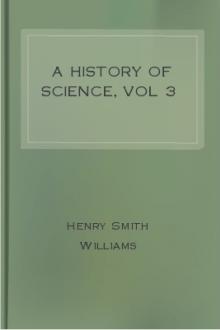A History of Science, vol 1 - Henry Smith Williams (novels for teenagers .txt) 📗

- Author: Henry Smith Williams
- Performer: -
Book online «A History of Science, vol 1 - Henry Smith Williams (novels for teenagers .txt) 📗». Author Henry Smith Williams
Polybius describes what was perhaps the most important of these contrivances, which was, he tells us, “a band of iron, hanging by a chain from the beak of a machine, which was used in the following manner. The person who, like a pilot, guided the beak, having let fall the hand, and catched hold of the prow of any vessel, drew down the opposite end of the machine that was on the inside of the walls. And when the vessel was thus raised erect upon its stem, the machine itself was held immovable; but, the chain being suddenly loosened from the beak by the means of pulleys, some of the vessels were thrown upon their sides, others turned with the bottom upwards; and the greatest part, as the prows were plunged from a considerable height into the sea, were filled with water, and all that were on board thrown into tumult and disorder.
“Marcellus was in no small degree embarrassed,” Polybius continues, “when he found himself encountered in every attempt by such resistance. He perceived that all his efforts were defeated with loss; and were even derided by the enemy. But, amidst all the anxiety that he suffered, he could not help jesting upon the inventions of Archimedes. This man, said he, employs our ships as buckets to draw water: and boxing about our sackbuts, as if they were unworthy to be associated with him, drives them from his company with disgrace. Such was the success of the siege on the side of the sea.”
Subsequently, however, Marcellus took the city by strategy, and Archimedes was killed, contrary, it is said, to the express orders of Marcellus. “Syracuse being taken,” says Plutarch, “nothing grieved Marcellus more than the loss of Archimedes. Who, being in his study when the city was taken, busily seeking out by himself the demonstration of some geometrical proposition which he had drawn in figure, and so earnestly occupied therein, as he neither saw nor heard any noise of enemies that ran up and down the city, and much less knew it was taken: he wondered when he saw a soldier by him, that bade him go with him to Marcellus.
Notwithstanding, he spake to the soldier, and bade him tarry until he had done his conclusion, and brought it to demonstration: but the soldier being angry with his answer, drew out his sword and killed him. Others say, that the Roman soldier when he came, offered the sword’s point to him, to kill him: and that Archimedes when he saw him, prayed him to hold his hand a little, that he might not leave the matter he looked for imperfect, without demonstration. But the soldier making no reckoning of his speculation, killed him presently. It is reported a third way also, saying that certain soldiers met him in the streets going to Marcellus, carrying certain mathematical instruments in a little pretty coffer, as dials for the sun, spheres, and angles, wherewith they measure the greatness of the body of the sun by view: and they supposing he had carried some gold or silver, or other precious jewels in that little coffer, slew him for it. But it is most certain that Marcellus was marvellously sorry for his death, and ever after hated the villain that slew him, as a cursed and execrable person: and how he had made also marvellous much afterwards of Archimedes’
kinsmen for his sake.”
We are further indebted to Plutarch for a summary of the character and influence of Archimedes, and for an interesting suggestion as to the estimate which the great philosopher put upon the relative importance of his own discoveries.
“Notwithstanding Archimedes had such a great mind, and was so profoundly learned, having hidden in him the only treasure and secrets of geometrical inventions: as be would never set forth any book how to make all these warlike engines, which won him at that time the fame and glory, not of man’s knowledge, but rather of divine wisdom. But he esteeming all kind of handicraft and invention to make engines, and generally all manner of sciences bringing common commodity by the use of them, to be but vile, beggarly, and mercenary dross: employed his wit and study only to write things, the beauty and subtlety whereof were not mingled anything at all with necessity. For all that he hath written, are geometrical propositions, which are without comparison of any other writings whatsoever: because the subject where of they treat, doth appear by demonstration, the maker gives them the grace and the greatness, and the demonstration proving it so exquisitely, with wonderful reason and facility, as it is not repugnable. For in all geometry are not to be found more profound and difficult matters written, in more plain and simple terms, and by more easy principles, than those which he hath invented.
Now some do impute this, to the sharpness of his wit and understanding, which was a natural gift in him: others do refer it to the extreme pains he took, which made these things come so easily from him, that they seemed as if they had been no trouble to him at all. For no man living of himself can devise the demonstration of his propositions, what pains soever he take to seek it: and yet straight so soon as he cometh to declare and open it, every man then imagineth with himself he could have found it out well enough, he can then so plainly make demonstration of the thing he meaneth to show. And therefore that methinks is likely to be true, which they write of him: that he was so ravished and drunk with the sweet enticements of this siren, which as it were lay continually with him, as he forgot his meat and drink, and was careless otherwise of himself, that oftentimes his servants got him against his will to the baths to wash and anoint him: and yet being there, he would ever be drawing out of the geometrical figures, even in the very imbers of the chimney. And while they were anointing of him with oils and sweet savours, with his finger he did draw lines upon his naked body: so far was he taken from himself, and brought into an ecstasy or trance, with the delight he had in the study of geometry, and truly ravished with the love of the Muses. But amongst many notable things he devised, it appeareth, that he most esteemed the demonstration of the proportion between the cylinder (to wit, the round column) and the sphere or globe contained in the same: for he prayed his kinsmen and friends, that after his death they would put a cylinder upon his tomb, containing a massy sphere, with an inscription of the proportion, whereof the continent exceedeth the thing contained.”[2]
It should be observed that neither Polybius nor Plutarch mentions the use of burning-glasses in connection with the siege of Syracuse, nor indeed are these referred to by any other ancient writer of authority. Nevertheless, a story gained credence down to a late day to the effect that Archimedes had set fire to the fleet of the enemy with the aid of concave mirrors. An experiment was made by Sir Isaac Newton to show the possibility of a phenomenon so well in accord with the genius of Archimedes, but the silence of all the early authorities makes it more than doubtful whether any such expedient was really adopted.
It will be observed that the chief principle involved in all these mechanisms was a capacity to transmit great power through levers and pulleys, and this brings us to the most important field of the Syracusan philosopher’s activity. It was as a student of the lever and the pulley that Archimedes was led to some of his greatest mechanical discoveries. He is even credited with being the discoverer of the compound pulley. More likely he was its developer only, since the principle of the pulley was known to the old Babylonians, as their sculptures testify. But there is no reason to doubt the general outlines of the story that Archimedes astounded King Hiero by proving that, with the aid of multiple pulleys, the strength of one man could suffice to drag the largest ship from its moorings.
The property of the lever, from its fundamental principle, was studied by him, beginning with the self-evident fact that “equal bodies at the ends of the equal arms of a rod, supported on its middle point, will balance each other”; or, what amounts to the same thing stated in another way, a regular cylinder of uniform matter will balance at its middle point. From this starting-point he elaborated the subject on such clear and satisfactory principles that they stand to-day practically unchanged and with few additions. From all his studies and experiments he finally formulated the principle that “bodies will be in equilibrio when their distance from the fulcrum or point of support is inversely as their weight.” He is credited with having summed up his estimate of the capabilities of the lever with the well-known expression, “Give me a fulcrum on which to rest or a place on which to stand, and I will move the earth.”
But perhaps the feat of all others that most appealed to the imagination of his contemporaries, and possibly also the one that had the greatest bearing upon the position of Archimedes as a scientific discoverer, was the one made familiar through the tale of the crown of Hiero. This crown, so the story goes, was supposed to be made of solid gold, but King Hiero for some reason suspected the honesty of the jeweller, and desired to know if Archimedes could devise a way of testing the question without injuring the crown. Greek imagination seldom spoiled a story in the telling, and in this case the tale was allowed to take on the most picturesque of phases. The philosopher, we are assured, pondered the problem for a long time without succeeding, but one day as he stepped into a bath, his attention was attracted by the overflow of water. A new train of ideas was started in his ever-receptive brain. Wild with enthusiasm he sprang from the bath, and, forgetting his robe, dashed along the streets of Syracuse, shouting: “Eureka! Eureka!” (I have found it!) The thought that had come into his mind was this: That any heavy substance must have a bulk proportionate to its weight; that gold and silver differ in weight, bulk for bulk, and that the way to test the bulk of such an irregular object as a crown was to immerse it in water. The experiment was made. A lump of pure gold of the weight of the crown was immersed in a certain receptacle filled with water, and the overflow noted. Then a lump of pure silver of the same weight





Comments (0)